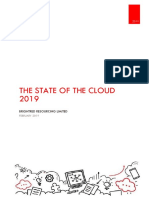Cloud computing is a model for enabling on-demand access to shared computing resources such as servers,
storage, networks, and applications over the internet, without direct active management by the user. The term
"cloud" of how these services is delivered from remote data centers spread across the globe.
In fact, according to a report by Gartner, global cloud service revenues are expected to exceed $623 billion by
the end of 2023, up from $411 billion in 2021
They offer unprecedented flexibility, allowing companies to scale their IT resources up or down based on real-
time needs. This ability to handle fluctuating workloads without investing in expensive hardware
infrastructure is critical for businesses operating in today's fast-paced digital economy.
Another major benefit of cloud computing is its cost-effectiveness. Organizations can adopt a pay-as-you-go
model, avoiding large capital expenditures on IT infrastructure. This has particularly helped startups and
small businesses that can now access enterprise-level resources without the need for significant upfront
investment.
For example, Dropbox, which started as a small startup, leveraged cloud services to build its file storage
platform, scaling it globally without needing to build its own server infrastructure.
The importance of cloud services is also evident from the way businesses manage operations during the
COVID-19 pandemic. The shift to remote work led to a surge in the use of cloud-based collaboration tools like
Zoom and Microsoft Teams. Microsoft Teams reported a 894% increase in user activity between February and
June 2020, while Zoom’s daily meeting participants skyrocketed from 10 million to 300 million in the same
period, all powered by cloud infrastructure.
This presentation will cover the key aspects of cloud services, focusing on leading providers such as Amazon
Web Services (AWS), Microsoft Azure, and Google Cloud. The presentation will explore various cloud
service models, such as Infrastructure as a Service (IaaS), Platform as a Service (PaaS), and Software as
a Service (SaaS), and discuss how these models are being used by businesses to drive efficiency and
innovation.
The presentation will also highlight cloud adoption trends across different industries, such as healthcare,
finance, retail, and manufacturing, demonstrating the widespread impact of cloud computing on global
business operations.
�In conclusion, cloud computing has rapidly transformed from an emerging technology into a fundamental part
of business strategy for companies worldwide.
The flexibility, scalability, and cost-efficiency provided by cloud platforms such as AWS, Microsoft Azure,
and Google Cloud have allowed organizations to innovate faster, reduce operational costs, and expand their
global reach.
As of 2024, over 94% of enterprises are using cloud services in some form, with over 67% of enterprise
infrastructure expected to be cloud-based by the end of 2024 (Flexera 2024 State of the Cloud Report).
Cloud services have been integral in enabling remote work, driving digital transformation, and supporting
advanced technologies like artificial intelligence (AI), machine learning (ML), and the Internet of Things
(IoT).
For instance, Netflix uses AWS to power its recommendation engine, delivering personalized content to over
230 million users globally.
The future of cloud computing looks even more promising with continued innovation in areas such as edge
computing, AI, and quantum computing. As more businesses migrate their operations to the cloud, the demand
for enhanced security, compliance, and sustainability will shape the next phase of cloud service offerings.
























































































